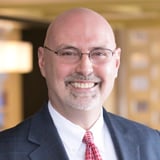Biglaw Managing Partner Opens Up About Alcoholism
This Biglaw partner is combating the stigma of substance abuse.

Steven Wall
In March 2009, Steven Wall became managing partner of Biglaw giant Morgan Lewis & Bockius, but that doesn’t mean he’s had a picture perfect ascension into a position of power and authority. In fact, the opposite is true. Wall struggled for years with alcoholism, and in the latest episode of the Legal Speak podcast, he is sharing his story in an effort to shatter the stigma surrounding the disease of addiction.
One of the key points that Wall makes in the podcast is that the disease of addiction is nondiscriminatory — your professional status will not stop the disease. And, in fact, according to a 2016 study sponsored by the Hazelden Betty Ford Foundation and the American Bar Association, lawyers suffer from alcoholism and other mental health issues at rates higher than in other professions.

Navigating Financial Success by Avoiding Common Pitfalls and Maximizing Firm Performance
The next logical question is why are lawyers so affected by substance use? Wall believes this is a complicated question, and the answers to the question are varied. Complicating the answer is that many lawyers abuse alcohol or indulge in it in problematic way, but not every lawyer who abuses alcohol is an addict. But too often alcohol and other substances are used by lawyers to deal with the pressure of being an elite lawyer.
Wall’s struggles with alcohol began as a student. At an Ivy League school for both undergrad and law school (Cornell for both), he was singularly focused on being the best student possible. When he was a young attorney, that perfectionism translated to his efforts to be the best lawyer possible. With that self-imposed pressure, for Wall, alcohol became a release. That, coupled with a biological predisposition towards addiction (both of his parents died from alcoholism), caused Wall to lead a double life where he was climbing the legal latter and still “managing the consequences” of his drinking because he couldn’t manage his drinking.
For much of Wall’s career there was a stigma around alcoholism. He recalls a senior partner at the firm saying to him, in total ignorance of the reality of the disease of addiction:
Steve, you are one the strongest, brightest people I know — I don’t understand why you cannot control your drinking.
Sponsored

Is The Future Of Law Distributed? Lessons From The Tech Adoption Curve

Navigating Financial Success by Avoiding Common Pitfalls and Maximizing Firm Performance

Legal AI: 3 Steps Law Firms Should Take Now

How Generative AI Will Improve Legal Service Delivery

Wall believes Biglaw firms are finally “waking up to reality” that the wellness of attorneys needs to be a priority. He says firms need to treat the wellness of attorneys the same way we treat their billable hours. Wall points out that the assets of a firm boil down to their attorney talent and their clients, so taking care of the talent has to be an important consideration for the firm or they’ll lose their clients.
At Morgan Lewis there are a few concrete steps the firm has put in place to prioritize employee wellness. The first is providing (and supporting with sweet tech hookups) remote working options for up to two days a week. This gives their attorneys the ability to deal with their life outside of their job, whether it be a doctor’s appointment or a contractor coming to the house. Wall says that lawyers work so many hours that the ability to work from home — and not have that be viewed negatively or somewhat less than — is important.
Morgan Lewis is also rolling out mandatory ethics CLEs in their offices on alcoholism/substance abuse. Wall says that the program, designed to help employees recognize and address addiction issues, takes the stigma from the disease away.
Wall deserves a lot of credit for making his own addiction issues public so that other struggling with substance abuse in Biglaw can see they aren’t alone and seek treatment.
Sponsored

Early Adopters Of Legal AI Gaining Competitive Edge In Marketplace

How Generative AI Will Improve Legal Service Delivery

 Kathryn Rubino is an editor at Above the Law. AtL tipsters are the best, so please connect with her. Feel free to email her with any tips, questions, or comments and follow her on Twitter (@Kathryn1).
Kathryn Rubino is an editor at Above the Law. AtL tipsters are the best, so please connect with her. Feel free to email her with any tips, questions, or comments and follow her on Twitter (@Kathryn1).







